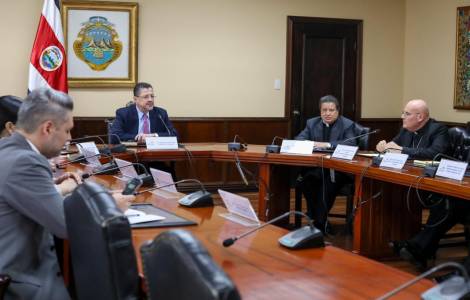
San José (Agenzia Fides) - The Bishops of the Episcopal Conference of Costa Rica met yesterday in the Presidential House, together with the new President of the Republic, Rodrigo Chaves Robles, and some government ministers. "With a listening attitude, we had a frank and sincere dialogue, seeking to unite our efforts for the common good of our society", said Monsignor José Manuel Garita Herrera, President of the Episcopal Conference of Costa Rica, after the meeting. The Bishops renewed their congratulations to the President and reiterated the will of the Church to contribute, as she has always done, to the construction of Costa Rica. In a letter dated April 4 (see Fides, 5/4/2022), they listed seven main problems that the country faces. "In all these issues, the central point that the Church has always placed at the center is the human person and respect for their dignity", said Monsignor Garita in statements released by Episcopal Conference. During the meeting, they talked about the deep and growing inequality between sectors and more so between areas, with the difference between people living in the Greater Metropolitan Area is profound compared to rural areas and coasts. The Bishops then highlighted the uncertainty that the country is experiencing due to the pandemic, the war in Ukraine, the economic crisis, etc. On the issues of abortion, euthanasia and old age as a disease, the Bishops reiterated their position in favor of life, from conception to natural death, and therefore their opposition to laws which do not respect life. Concerns have also been expressed about the promotion of gender ideology and the progression of a real "ideological colonization", as also warned by Pope Francis. During the meeting, the work of the Church was presented through the various pastoral, social, educational and family ministries. Finally, the Bishops spoke of the need for government leaders to listen in order to guide and strengthen social peace in Costa Rica. "This listening is essential to perceive reality in the best possible way and to be open to contributions from other sectors of society", highlighted Monsignor José Manuel Garita Herrera. (SL) (Agenzia Fides, 20/5/2022)